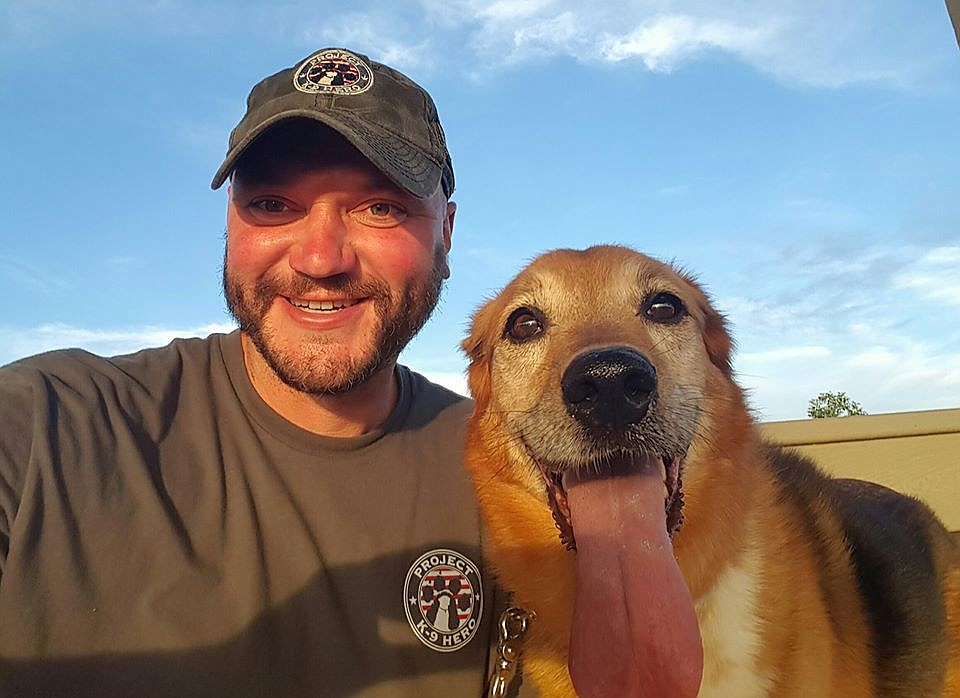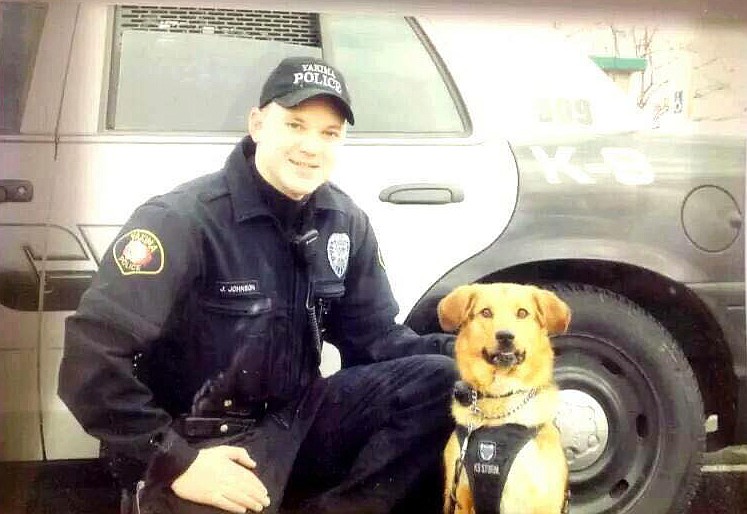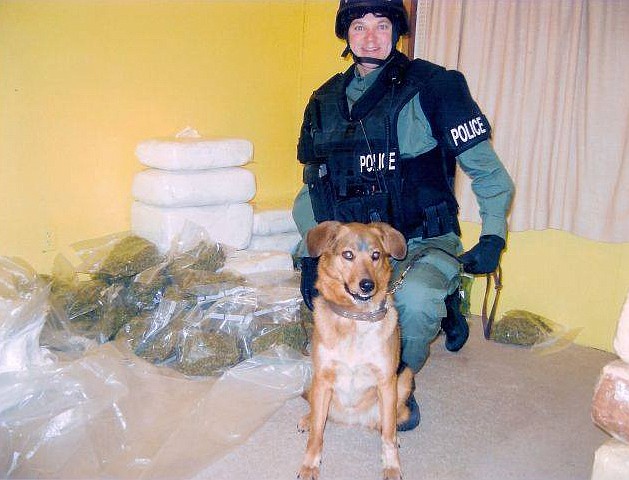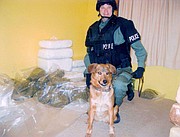K-9 Chief joins proud pack of law, military dogs aided by Project K-9 Hero
EMRY DINMAN | Hagadone News Network | UPDATED 5 years, 9 months AGO
MOSES LAKE — When it was announced Wednesday that newly-retired K-9 Chief’s medical and food costs would be covered for life by national nonprofit Project K-9 Hero, the former officer became the 83rd member of a proud pack.
The organization was founded in 2016 by Jason Johnson, a former K-9 handler with the Yakima Police Department, to ensure that four-legged officers and soldiers receive the retirement they deserved after their years of service.
“There’s really not any programs in place to help a dog like Chief when they retire,” Johnson said in an interview. “A lot of that financial burden falls back on the handler. I thought there needed to be a better way.”
Having worked himself with over a dozen K-9 partners over the years, Johnson speaks from experience.
A military police officer from 1993 until 1998, he became a law enforcement officer in Pierce County for a few years before transferring to the Yakima Police Department in 2003. At the time, there were no narcotics K-9 units with the department, Johnson said. But after seeing their impact in Pierce County, he worked for the next two years to get the program started.
Come 2005, it was time to get the department’s first dog. Noting the continuous donations the Moses Lake Police Department has gotten for its K-9 units, both in recent years and after K-9 Chief was shot, Johnson said the same level of charity wasn’t available for the YPD at the time. Instead of turning to internationally-recognized breeders as MLPD did to acquire Rex, its most recent K-9 officer, the department turned to the Washington Animal Shelter in Everett.
That’s where the department discovered Flash.
Flash, an energetic orange mutt with floppy ears, a German shepherd’s body and a Labrador’s face, had been found on the streets of Everett with no home or tags and a reduced white blood cell count due to her hardscrabble life. Unable to socialize with other dogs, she had been scheduled to be euthanized. Instead, that same day she was accepted by her trainer to attend a narcotics K-9 training course.
It took time, but Flash got healthier and began to excel at detecting narcotics. By the time of graduation, Flash was the only dog in her class to get a perfect score, and became the city of Yakima’s first narcotics dog.
She started her almost decade-long career alongside her handler, Johnson. Between 2005 and 2013, Flash worked with the department’s patrol division, two separate narcotics task force units and the regional SWAT team conducting high risk search and seizures. By the time she retired, she had found narcotics more than 2,000 times during over 3,000 deployments.
Though Flash spent many of those early years working side-by-side with Johnson, he would eventually take a position in 2008 as an explosive detection K-9 handler with the U.S. State Department. He went on three tours in Iraq and a 2010 tour in Afghanistan doing personal security work for the U.S. ambassador.
In 2013, when Flash’s career ended, Johnson got a call. Her more recent handlers couldn’t keep her and she had no other home.
By then, years of service and a bout of Lyme disease had worn Flash down and built the medical bills up. And she wasn’t alone — across the country, retired law enforcement and military dogs, and those who adopted them, faced the same possible financial strain.
“Think of a professional athlete or a special operations soldier who did a hundred and fifty airborne jumps, when they get older, they’re going to have problems with their joints, their bones,” Johnson said. “Many times they’re retiring and they seem okay, but we’re finding that once they get up in the golden years, they’re having some major health issues.”
When, in 2015, Johnson took a position with the Department of Homeland Security as a K-9 field coordinator in charge of the airport screening dogs program, he found himself in the position handling the retirement of K-9s. When a vet said, for whatever reason, that the dog could no longer fulfill its duties, he was in charge of finding the handler a new dog and getting them enrolled in training again.
But he was also in the position of removing those dogs from the government’s rolls, absolving it of financial obligations to the dog.
“And unfortunately, that financial burden is put 100 percent on whoever adopts the dog,” Johnson said. “I didn’t feel that was a proper way to handle that. The handlers are not getting paid extra money to pay these bills.”
So, in 2016, Project K-9 Hero was born, aiming not only to pay for medical and food bills for retired K-9s, but also to find homes for those who can’t stay with their handlers. The face of the fledgling non profit? The energetic orange mutt that had survived against the odds to serve her community for the better part of a decade.
“She’s the epitome of a survivor,” Johnson said. “We talk about that during public speaking events, and I’ve spoken with tens of thousands of kids at this point, that Flash’s message is you can accomplish anything in life that you want to if you work hard enough for it.”
Though Flash recently passed away, her legacy lives on, whether with her own children’s book, “K-9 Flash Becomes a Hero,” or in the organization that now supports 83 retired dogs and counting.
That support comes from a combination of sources, including corporate sponsors, fundraisers and individual donations. Those who want to support Chief and dogs like him, or to simply read their stories, can go to projectK-9hero.org.
Emry Dinman can be reached via email at [email protected].
ARTICLES BY EMRY DINMAN
Mattawa Police Department to use new emergency alert system
The Mattawa Police Department will be using a new emergency alert system to better and more quickly inform residents of fires, traffic hazards and other incidents.
Royal City seeking new councilmember
The Royal City Council is going to enter the new year short one councilmember, and is currently soliciting applications from individuals interested in filling the position.
Mattawa looks to the legislature to make filling agency easier
To combat the difficulties Mattawa has had filling its Civil Service Commission, the town is deploying municipal lawyer Katherine Kenison to lobby the legislature to simplify the process during the upcoming legislative session.







